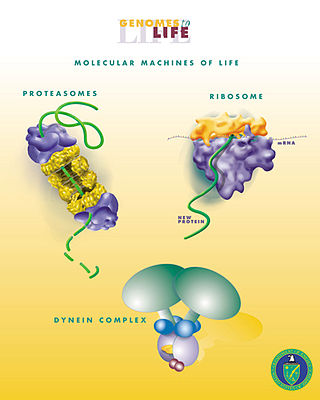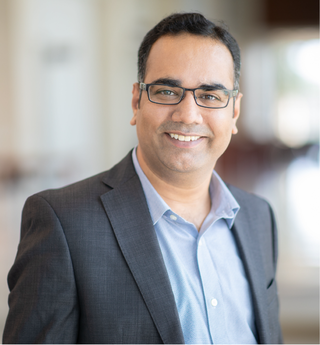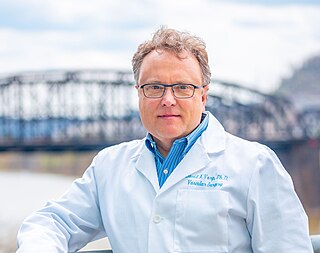Related Research Articles

Biological engineering or bioengineering is the application of principles of biology and the tools of engineering to create usable, tangible, economically viable products. Biological engineering employs knowledge and expertise from a number of pure and applied sciences, such as mass and heat transfer, kinetics, biocatalysts, biomechanics, bioinformatics, separation and purification processes, bioreactor design, surface science, fluid mechanics, thermodynamics, and polymer science. It is used in the design of medical devices, diagnostic equipment, biocompatible materials, renewable energy, ecological engineering, agricultural engineering, process engineering and catalysis, and other areas that improve the living standards of societies.

Russ Biagio Altman is an American professor of bioengineering, genetics, medicine, and biomedical data science and past chairman of the bioengineering department at Stanford University.

The American Institute for Medical and Biological Engineering (AIMBE) is a non-profit organization founded in 1991, and headquartered in Washington. It represents 50,000 medical and biomedical engineers, and academic institutions, private industry, and professional engineering societies.
William E. Bentley is the Robert E. Fischell Distinguished Professor of Engineering, founding Director of the Fischell Institute for Biomedical Devices, and currently the Director of the Maryland Technology Enterprise Institute in the A. James Clark School of Engineering at the University of Maryland. He was previously the Chair of the Fischell Department of Bioengineering, where he assisted in establishing the department and provided leadership that led to its nationally ranked status.

Samir Mitragotri is an Indian American professor at Harvard University, an inventor, an entrepreneur, and a researcher in the fields of drug delivery and biomaterials. He is currently the Hiller Professor of Bioengineering and Hansjörg Wyss Professor of Biologically Inspired Engineering at Harvard John A. Paulson School of Engineering and Applied Sciences and the Wyss Institute for Biologically Inspired Engineering. Prior to 2017, he was the Duncan and Suzanne Mellichamp Chair Professor at University of California, Santa Barbara.
Lydia E. Kavraki is a Greek-American computer scientist, the Noah Harding Professor of Computer Science, a professor of bioengineering, electrical and computer engineering, and mechanical engineering at Rice University. She is also the director of the Ken Kennedy Institute at Rice University. She is known for her work on robotics/AI and bioinformatics/computational biology and in particular for the probabilistic roadmap method for robot motion planning and biomolecular configuration analysis.
Robert M. Nerem, often referred to as Bob Nerem, a member of the U. S. National Academy of Engineering and the Institute of Medicine, held the Parker H. Petit Distinguished Chair for Engineering in Medicine and Institute Professor Emeritus at the Georgia Institute of Technology where he was an Emeritus Professor until his death.

Ravi V. Bellamkonda is an Indian-American biomedical engineer and academic administrator. Since 2021, he has served as Provost and Executive Vice President for Academic Affairs at Emory University in Atlanta, Georgia. Bellamkonda was previously Vinik Dean of the Pratt School of Engineering at Duke University.
Rebecca Richards-Kortum is an American bioengineer and the Malcolm Gillis University Professor at Rice University. She is a professor in the departments of Bioengineering and Electrical and Computer Engineering, and she is the Director of Rice 360°: Institute for Global Health, and the Founder of Beyond Traditional Borders. She is the Director of the Institute of Biosciences and Bioengineering, and serves as the advisor to the Provost on health-related research.
Shuming Nie is a Chinese-American chemist. He is the Grainger Distinguished Chair in Bioengineering at the University of Illinois at Urbana-Champaign. He was the Wallace H. Coulter Distinguished Faculty Chair in Biomedical Engineering at Emory University. In 2007, Nie was elected as a fellow of the American Institute for Medical and Biological Engineering (AIMBE). In 2012, Nie was elected as a fellow of the American Association for the Advancement of Science (AAAS).

Akhilesh K. Gaharwar is an Indian academic and a professor in the Department of Biomedical Engineering at Texas A&M University. The goal of his lab is to understand the cell-nanomaterials interactions and to develop nanoengineered strategies for modulating stem cell behavior for repair and regeneration of damaged tissue.
Susan Margulies is an American engineer and assistant director of the U.S. National Science Foundation, heading the Directorate for Engineering. She is also the Georgia Research Alliance Eminent Scholar in Injury Biomechanics and Professor in the Wallace H. Coulter Department of Biomedical Engineering at the Georgia Institute of Technology and Emory University, where she served as chair from 2017 to 2021. She is a world leader in the biomechanics of head injury in infants.

Steven R. Little is an American chemical engineer and pharmaceutical scientist. He currently holds the title of department chair, distinguished professor, and the William Kepler Whiteford Endowed Professor of Chemical Engineering at the University of Pittsburgh Swanson School of Engineering. He also holds secondary appointments in bioengineering, pharmaceutical sciences, immunology, ophthalmology and the McGowan Institute for Regenerative Medicine at the University of Pittsburgh.

Eberhard O. Voit is a Clinical Professor at the University of Texas at Dallas. Until 2024, he was a Professor and David D. Flanagan Chair in Biological Systems at the Georgia Institute of Technology and a Georgia Research Alliance Eminent Scholar. He leads the Laboratory for Biological Systems Analysis.

Gilda A. Barabino is the president of the Olin College of Engineering, where she is also a professor of biomedical and chemical engineering. Previously, she served as the dean of The Grove School of Engineering at the City College of New York, and as a professor in the Departments of Biomedical Engineering and Chemical Engineering and the CUNY School of Medicine. On March 4, 2021, she became the President-Elect of the American Association for the Advancement of Science.
Jerome Schultz is an American bioengineering researcher, professor, and university administrator. He is a fellow of several national scientific societies and a member of the National Academy of Engineering. He has held professorships at the University of Michigan, the University of Pittsburgh, University of California, Riverside, and he is currently a Distinguished Professor of Biomedical Engineering at the University of Houston.
Manu Omar Platt is an American biomedical engineer serving as the director of the NIH Biomedical Engineering Technology Acceleration (BETA) center. He also serves as NIBIB Associate Director for Scientific Diversity, Equity and Inclusion.

David A. Vorp is an American bioengineer, researcher, entrepreneur, and academic administrator noted for his contributions to aortic aneurysm biomechanics and pathobiology, and tissue engineered vascular grafts. He currently holds the titles of Associate Dean for Research at the University of Pittsburgh Swanson School of Engineering and the John A. Swanson Professor of Bioengineering, with secondary appointments in the departments of Cardiothoracic Surgery, Surgery, Chemical & Petroleum Engineering, and the Clinical & Translational Sciences Institute at the University of Pittsburgh. He also serves as the co-director of the Center for Medical Innovation., the acting director of the university's GRID Institute, and the director of the Vascular Bioengineering Laboratory.
Barbara Dale Boyan is the Alice T. and William H. Goodwin, Jr. Dean, College of Engineering at Virginia Commonwealth University College of Engineering.
May Dongmei Wang is a Chinese-American biomedical engineer whose research involves biomedical big data analytics, the interpretation and application of big data in medicine and biology, as generated from microarrays and quantum dots. She is a professor of biomedical engineering and Wallace H. Coulter Distinguished Faculty Fellow in the Wallace H. Coulter Department of Biomedical Engineering, a joint program of Georgia Tech, Emory University, and Peking University.
References
- ↑ "Larry McIntire". Georgia Institute of Technology. Retrieved 7 October 2023.
- 1 2 Korschun, Holly (21 April 2003). "Rice's McIntire named chair of bioengineering for Emory, GT". Emory University. Retrieved 7 October 2023.
- 1 2 "McIntire Named Fellow of Science Association". Rice University. 29 October 1998. Retrieved 7 October 2023.
- ↑ "LARRY MCINTIRE, PH.D. AIMBE College of Fellows Class of 1992". American Institute of Medical and Biological Engineering. Retrieved 7 October 2023.
- ↑ "AIMBE past presidents". American Institute of Medical and Biological Engineering. Retrieved 7 October 2023.
- ↑ "Dr. Larry V. McIntire". United States National Academy of Engineering. Retrieved 7 October 2023.
- ↑ "Larry McIntire Wallace Coulter Chair Emeritus". Georgia Institute of Technology. Retrieved 7 October 2023.
- ↑ Smith, Matt (17 May 2016). "Larry McIntire helping ensure scientists have 'voice' in Washington". American Association for the Advancement of Science. Retrieved 7 October 2023. Republished by the American Institute of Medical and Biological Engineering